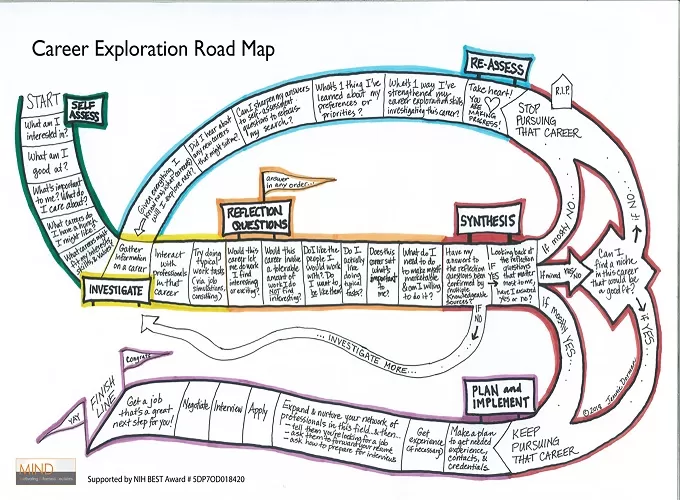Waiting is Hard to Do
From the Archive: Blog written by Michael J. Sheridan, MSW, PhD, Special Advisor for Diversity and Wellness Programs, [email protected] It is December 2019, and while many are enjoying the holidays, if you are trainee, you are probably asking yourself, “I haven’t heard back from a number of medical schools, is there something I can do to move them along? Should I assume I won’t get in? Will I get an interview at the graduate programs that I applied to? I am waiting to hear from academic positions …is there anything I can do? The good news is that, if you haven’t heard anything yet, you are still being considered. With the holidays fast approaching, it is probable that most communication will resume in the new year. The reality is that waiting for a response is hard thing to do.  Dr. Michael Sheridan, Special Advisor for Diversity and Wellness Programs offers some strategies to help and writes that an area to be aware of while you wait is what is going on in your mind – specifically, the “inner chatter” that is present. It’s important to realize that you “talk” to yourself more than anyone else and thus, what you are saying makes a difference. There are two particular qualities of this inner chatter to be mindful of – the “when” and the “what.” The “when” of your inner dialogue refers to how much the mind is focused on either the past (“I wish I had remembered to put X in my application.” “I should have had so and so critique my letter before I sent it.”) or the future (“What will I do if I don’t get any interviews?” “If I don’t hear back from them by the end of this week, it means I didn’t get in”). The reality of both past and future musings (or let’s face it, worrying) is that it is truly wasted effort as you can’t change something that’s already happened and you can’t predict what is going to happen in the future! The only moment you have any control of is the current moment – and even then, I’m talking about control of your own thoughts and behaviors – not the actions of others or the eventual outcome. Focusing on what you can do versus what you can’t lowers anxiety and builds confidence. The “what” of your inner chatter has to do with the overall message or tone of what you are saying to yourself. Are your thoughts harshly self-critical? (“I know I did a terrible job on that personal essay – I probably sounded really stupid”) Do they have a doomsday or “catastrophizing” flavor to them? (“I didn’t get this position, which means I won’t get any of the others I applied for either”) Or are they balanced and positive? (“I know I won’t get accepted by everyone, but I probably won’t get rejected by everyone either” -“I’ve done the best I can and I can handle whatever the next step needs to be”). A good thing to cultivate during the waiting is compassionate self-talk, or treating yourself with “the same kindness, care, and concern that you would treat a good friend” (Dr. Kristen Neff, www.self-compassion.com). So notice what you’re saying to yourself and if it is not supportive, ask yourself if you would say this to a good friend. Chances are, you would offer something more encouraging, so try being your own good friend! In addition to Dr. Sheridan’s suggestions above, we invite you to visit our blog, where we suggested some activities to engage in during the holidays that will help you prepare to continue pursuing your career goals. Also, be sure to visit our OITE web page as well to attend workshops and schedule an appointment with a career counselor. If you are one of our extended community readers, please check with your home institution and local resources for career services. We will see you in 2019!
Dr. Michael Sheridan, Special Advisor for Diversity and Wellness Programs offers some strategies to help and writes that an area to be aware of while you wait is what is going on in your mind – specifically, the “inner chatter” that is present. It’s important to realize that you “talk” to yourself more than anyone else and thus, what you are saying makes a difference. There are two particular qualities of this inner chatter to be mindful of – the “when” and the “what.” The “when” of your inner dialogue refers to how much the mind is focused on either the past (“I wish I had remembered to put X in my application.” “I should have had so and so critique my letter before I sent it.”) or the future (“What will I do if I don’t get any interviews?” “If I don’t hear back from them by the end of this week, it means I didn’t get in”). The reality of both past and future musings (or let’s face it, worrying) is that it is truly wasted effort as you can’t change something that’s already happened and you can’t predict what is going to happen in the future! The only moment you have any control of is the current moment – and even then, I’m talking about control of your own thoughts and behaviors – not the actions of others or the eventual outcome. Focusing on what you can do versus what you can’t lowers anxiety and builds confidence. The “what” of your inner chatter has to do with the overall message or tone of what you are saying to yourself. Are your thoughts harshly self-critical? (“I know I did a terrible job on that personal essay – I probably sounded really stupid”) Do they have a doomsday or “catastrophizing” flavor to them? (“I didn’t get this position, which means I won’t get any of the others I applied for either”) Or are they balanced and positive? (“I know I won’t get accepted by everyone, but I probably won’t get rejected by everyone either” -“I’ve done the best I can and I can handle whatever the next step needs to be”). A good thing to cultivate during the waiting is compassionate self-talk, or treating yourself with “the same kindness, care, and concern that you would treat a good friend” (Dr. Kristen Neff, www.self-compassion.com). So notice what you’re saying to yourself and if it is not supportive, ask yourself if you would say this to a good friend. Chances are, you would offer something more encouraging, so try being your own good friend! In addition to Dr. Sheridan’s suggestions above, we invite you to visit our blog, where we suggested some activities to engage in during the holidays that will help you prepare to continue pursuing your career goals. Also, be sure to visit our OITE web page as well to attend workshops and schedule an appointment with a career counselor. If you are one of our extended community readers, please check with your home institution and local resources for career services. We will see you in 2019!



